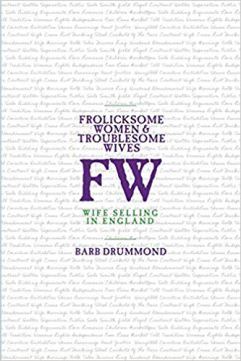Barb Drummond's Blog
October 15, 2018
Sally’s Cafe and Bookstore – New book on the shelves – Frolicksome Women and Troublesome Wives: Wife Selling in England by Barb Drummond

Welcome to a new author to the cafe and bookstore… Barb Drummond and her latest book released at the end of August – Frolicksome Women & Troublesome Wives – Wife Selling England.
 About the book
About the book
In the late 18th century, French travellers claimed an Englishman tired of his wife could dispose of her at Smithfield’s beast market. Examples can be found scattered through press records. Some were, as often claimed, brutal, sometimes drunken affairs. But others were civilised, even joyful events ending in marriage-style dinners. They varied widely over time, place, and practice. In England marriage was easily entered into, but was virtually impossible to escape. Sales took many forms to ensure they were legal, and rituals were often incorporated.
This book is about the nature of marriage itself, of what it meant to our ancestors, of how the public responded to disputes, and about the rights of women and…
View original post 285 more words
September 11, 2018
The Last Post
Hello lovely readers and followers. In under a fortnight I am launching my new books, and with that I have also launched a new website, so this post will be my last.
Thanks for the support and the friends I have made here. Please join me at http://www.barbdrummond.com
September 4, 2018
Father and Daughter
The wonderful ‘Mr Lessmore’s Flying Books’ won the oscar for best animation, but here’s one from 2000, ‘Father and Daughter’ by Michael Dudok de Wit. It is described as a story of love between father and daughter, but I saw it as part of an exhibition at ‘sHertogdenbosch Art Gallery on the subject of time. It is also a fine example of storytelling without words. Enjoy!
http://www.openculture.com/2011/03/father_and_daughter_an_oscar-winning_animated_short_film.html
and in case you have been living in a hole and missed the winner:
August 25, 2018
Launch Date!
My three books will be released on an unsuspecting (except for you dear readers) public on September 24. If you’re in the Cardiff area you will be welcome at the launch.
Tom Waits : Kentucky Avenue
July 28, 2018
THE MIDAS OF MANUMISSION: The Orphan Samuel Gist and his Virginian Slaves
This is a story that appeared in my research for the British Empire and Commonwealth Museum to celebrate the bicentenary of the Abolition of the Slave Trade back in 2007. The bare bones of the story are that Samuel Gist was an orphan from Bristol who was educated at one of the city’s charity schools and sent to Virginia as a ‘shop boy’. He became a successful tobacco merchant there, with George Washington as a colleague, before returned to Britain to become very rich. His passion and ability at making money seems to have almost been an illness, like Midas. Yet he had no male heirs, so there was nobody to pass on his huge wealth, to continue his family name.
This book looks at the early days of the North American colonies, of the Tudor practice of sweeping the streets of cities of the many homeless children to short, miserable lives on tobacco plantations. It shows how and why African slavery gradually overtook white slavery, and the close links between it and the criminalisation of the poor that led to the founding of Australia.
Samuel Gist’s will provided legacies for many charities in Bristol and London where he has been largely forgotten, but his desire to fund the freeing of his slaves has ensured that he is still remembered in the USA, with some people still sharing his family name.
Gist was a complex and often reviled character for owning , and at times trading in slaves, but his former slaves described him and his daughters as being kind to them. His manumission of hundreds of slaves occurred at a difficult time, after the War of 1812 and the final battle between Britain and France, and many problems prevented the scheme from succeeding. But he set a precedent, and may have encouraged many others to free their slaves. Against all the odds, one of his settlements survives, and descendants of his former slaves now meet to share their legacy.
July 27, 2018
FROLICKSOME WOMEN & TROUBLESOME WIVES: Wife Selling in England
This seems to be the book that makes most people prick up their ears when I mention the title. Which is great, because it is an amazing story, full of humour and surprises. It also provides a lot of challenges to the notion that women were powerless.
When trawling through old newspapers some years ago I stumbled upon an account from Stamford in 1786 of a wife who was sold to Thomas Hardy — a glorious coincidence — but this one was a cordwainer of Spalding in Lincolnshire. This was interesting enough, but the event was one that haunted me for years as I struggled to understand what had happened there.
Wife sales are generally assumed to be by brutal husbands wishing to rid themselves of a woman they were tired of. But in this sale, the wife had agreed to be delivered in a halter by her husband Thomas Hand. A written agreement was signed and witnessed, and the woman dined at the head of the table when nine people celebrated the event with a dinner. She was described as showing great composure, a term generally applied to women at their wedding.
This does not read as an act of brutality or oppression; it seems more to be an act of great civility and sadness, a means of remedying an unhappy marriage. Most accounts of wife selling focus on the husband being rid of his spouse, so was seen as either brutal or sad that the hopes of the marriage had not been fulfilled. But it was also a re-marriage, so the event was often an opportunity to celebrate a new partnership, for all three of those involved to be given a second chance, to start again.
England was the only Protestant country to retain its draconian Pre-Reformation divorce laws. Yet until 1745 there was no legal definition of what constituted a marriage. Many people married in haste but were then stranded in a relationship which had lost its magic, and for many had become a prison. There is no lack of irony that England’s Reformation was triggered by the need for the monarch to separate from a barren wife to marry a new one to ensure a male heir to the throne. Yet the huge expense of divorce prevented all but a handful of divorces, all of which were driven by the same need: for the continuance of a family and is fortune.
This book is about the many and surprisingly varied wife sales. These provide valuable insights into the lives of ordinary people, and of how inventive they were when faced with the restrictions of the legal system. Though many of the sold wives were not named, their behaviour shows us that even with the oppressive laws stacked against them, many had the bravery to find their own solutions to their problems. What seems to be a story of female oppression provides us with a surprisingly broad spectrum of women and men forging their own futures, reminding us that women had rights long before there were enforced by law. Much better than the man coming home every day to find his dinner in the dog.
Please let me know if you would like to read and review this before publication. Just send me your email. Thanks!
July 26, 2018
MR BRIDGES’ ENLIGHTENMENT MACHINE: Forty Years on Tour in Georgian Britain
This is a book which began from my research into the rebuilding of Bristol Bridge. Not the famous one built by I K Brunel, but the city’s namesake in the centre of the city which is so busy with traffic that many people don’t even notice it. It was rebuilt against much local apathy and opposition by the wonderfully aptly named James Bridges who appeared in Bristol with no previous experience in building, who dragged the city’s built environment into the then-modern age. Then as the bridge was nearing completion he suddenly left, quite literally sailing off into the sunset.
James deserved a book and I wrote it, but he claimed he had learnt all he knew from his father Henry Bridges of Waltham Abbey who built The Microcosm, or Little World, a giant musical and astronomical clock which toured the Atlantic world for 40 years, then vanished and part of it was found in Paris and now loiters in a corner of the British Museum.
This book is about Henry and what little is known about his life and family, but it tells us much about the early eighteenth century, the Augustan Age when so many people were becoming architects, poets, writers, engineers, astronomers, chemist and much more. Many famous people seem to be like children let loose in the best adventure playground: their world. Much of their work has been overtaken by later, more spectacular achievements, but it was this early period when we see Britain emerging from centuries of darkness; by focusing on the arts in their widest sense, they helped make their country a better place, and they became better, more rounded and civilised people. There is much we can learn from them as each day seems to bring more evidence that the world we live in has gone completely mad.
If you would like to read this in advance of publication and provide me with some feedback, please give me your email address and I will send you a copy through the magic of modern technology that Henry could not have ever dreamed of.
July 25, 2018
The Books are Written!
Hello lovely readers! I apologise yet again for my long silence, but it has been productive. I have now cleared away most of my research books and notes so I am no longer at risk of breaking my neck every time I move around my workroom.
I have completed my three books which will be launched as soon as my cover design is complete. In the meantime, here is a quick taster of what I’ve been working on. All three are very different books, focusing on early technology, wife selling and slavery/abolition, but they are linked in time – they are all concerned with eighteenth century Britain, a period that is mostly underrepresented, or scattered with stories of drunkenness and bad behaviour.
But it was when England emerged, confused and exhausted from the drawn out chaos and carnage of the Reformation, civil war and plague to stumble into creating a huge and largely successful empire. This is not to deny that horrific things happened, but there was – and still is – much about this tiny archipelago and its people that is extraordinary. The language you are reading this in is the world’s major language, of academia, of air traffic control and maritime trade because these islands once dominated world navigation and trade, of pop music and culture.
This is from E. Keble Chatterton’s book English Seamen and the Colonization of America in which he describes the first settlement there:
“Thomas Smith and his friends were merely following the precedent of Spain, who had exploited the New World with the most satisfactory results financially. But the Anglo-Saxon mind was of a peculiar sort. Centuries of history had given the insular-bred English character a keen sensitiveness regarding freedom. England, from her geographical position and the paucity of shipping, had been aloof from European influences to a surprising degree. But she had worked out during the Middle Ages an extension of liberty to her people. The suppression of the Barons, the legal reforms, the summoning of he first representative Parliament under Edward I, the forbidding of taxation without Parliament’s consent, the sixteenth-century assertion of national freedom from Rome, the strenuous resistance of Spain’s maritime exclusiveness, all these and many smaller movements had made Thomas Smith’s fellow-countrymen almost fanatical in their attitude toward unfettered right to live as they pleased. The psychology of the English crowd is that it will endure every kind of misery and physical suffering on behalf of freedom; but in the absence of liberty it will magnify every small inconvenience, lose all interest, become rebellious and fight to the last ditch against tyranny and injustice. In those days the intellect was less quick to reason and resolve than modern education and experience have enabled. It took 169 years, or several generations, before the American colonists broke out in revolt against the very principles which had been laid down by a London company of hard-headed, keen, astute but unsympathetic men in 1606. Lack of imagination, neglect to consider the possible reaction of a tight policy on struggling human beings, are faults quite as serious as slackness or rashness;”
I believe that people have a default setting to be good. Children are not born racist, misogynist or any other -ists. This is something that is learned from life. Much of my work focuses on why people behaved as they did. I try to make no judgements, as I was not there; ultimately we can never really know what happened.
What I offer you is thus a load of guesswork. But I have spent years reading and thinking about these stories. I think my guesses come close to the truth, or at least as close as it is possible at this distance in time.
February 5, 2018
Rey
This is by Niles Attalah and is an utterly bizarre film – even by my standards – the true-ish story of a French explorer who became king of the Mapuche tribes in chile, but was charged with treason by chile’s authorities for inciting rebellion. Its mostly in Spanish so you can really get lost in it.
The wonderfully named Orelie-Antoine de Tounes was one of several Europeans who seemed to have sought some sort of paradise cum personal epiphany in the New World, but who instead found the opposite. His story has echoes of Conrad’s Heart of Darkness and Patrick White’s Vos. Yes these are fiction, which is apt as his story is too strange to be true, yet it was.
The film itself looks like retrieved footage, with lots of scratchings and colour changes, dreamlike sequences and peaceful forests, spectacular vistas. When de Tounes is arrested everyone wears masks, so it becomes a puppet show, and yet this somehow adds to the drama. There are hallucinatory scenes, creatures with giant heads paying homage to the man who believed he had come to save the local people yet was unable to save himself. People pay a lot of money for drugs that are not as good as the wierdness of this film.
[image error]




